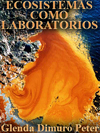
Glenda Dimuro Peter
Esta página muestra parte del texto pero sin formato.
Puede bajarse el libro completo en PDF comprimido ZIP (200 páginas, 4.10 Mb) pulsando aquí
RESUMEN
A través del campo de estudio de la Ecología Social, las interacciones entre la sociedad y el medio, relacionando fenómenos sociales con los ecológicos y revisando los conceptos de sociedad, podemos considerar los sistemas humanos como ecosistemas urbanos, concibiendo la ciudad como un conjunto de organismos interconectados y con cierto grado de autonomía, funcionando como soporte para los sistemas sociales y articulando el global y el local. Encontramos en los sistemas naturales las claves para tornar el concepto de sostenibilidad operativo en los ecosistemas urbanos, concientizándonos de que no necesitamos inventar comunidades urbanas sostenibles desde cero, pero si moldearlas de acuerdo con la naturaleza y las teorías de la ecología. Considerando la ciudad como un ecosistema abierto y basándonos en las teorías sobre la ecología y los sistemas vivos presentadas en esta investigación, en la noción de autorregulación, redes y en los lazos de retroalimentación de los sistemas vivos, pero principalmente en dos conceptos básicos, que es la idea de los ciclos y comunidades, podemos formular otros criterios para desarrollar la práctica de sostenibilidad (desde el ámbito social, ecológico, económico, geográfico y cultural) en los sistemas humanos, logrando su operatividad con el surgimiento de las comunidades de práctica compuestas de ciudadanos ecoalfabetizados y avanzando hacia el ecodiseño. De hecho, podríamos definir el enfoque en la búsqueda de factores de equilibrio entre la naturaleza y ciudad, entre tradición y progreso, entre procesos globales y locales, entre individuo y comunidad, elementos que forman parte de los sistemas sociales (humanos) y ambientales (naturales), sistemas vivos y que por lo tanto son atravesados por flujos de materia y energía. Cuanto más de estos criterios se aproximen al carácter cíclico y auto regulador de los procesos naturales, más sostenibles serán los procesos conducidos por el hombre. La ciudad, los hombres y la naturaleza, o sea, ecosistemas urbanos, sociales y naturales serán utilizados como laboratorio para la realización de este trabajo, que además pretende reconocer la problemática como la suma de todos los problemas en los distintos ámbitos (económicos, sociales y ecológicos) y que por lo tanto, exige que alcancemos respuestas o explicaciones complejas que van más allá de los simples mecanismos acumulativos.
Palabras claves:
Comunidad, ecoalfabetización, ecodiseño, ecología, ecología social, ecología urbana, sostenibilidad.
ABSTRACT
Through the studies in Social Ecology, considering the interactions between the society and the environment, relating the social and ecological phenomena and reviewing the concept of society, its possible to consider the human systems as urban ecosystems, conceiving the city as a set of interconnected organisms with a certain degree of autonomy, supporting the social systems and articulating the global and the local. We found in the natural systems the keys for applying the concept of operational sustainability in urban ecosystems, realizing that it is not necessary to invent sustainable urban communities from the very beginning, but molding them according to the nature and theories of the ecology instead. Considering the city as an open ecosystem, and based on the theories of the ecology and live systems presented in this research, on the notion of self-regulation, nets and on the retro-alimentation loops of live systems, and mainly on two basic concepts, namely the ideas of cycles and communities, it is possible to formulate other criteria to develop the practice of sustainability (on social, ecological, economical, geographical and cultural basis) in the human systems, obtaining their effective functionality with the rising of the communities of practice, composed by eco-literate citizens and going toward the eco-design. Actually, it is possible to define the focus of the investigation of the conditions of the equilibrium between the nature and the city, between tradition and progress, between global and local processes, between the individual and the community, elements that take part in the social (human) and environmental (natural) systems, live systems, and, therefore, are crossed by flows of matter and energy. The most such criteria approximate to a cyclical and self-regulator character of the natural processes, the most sustainable will be the processes conduced by man. The city, the men and the nature, that is, the urban, social and natural eco-systems, are used as a laboratory for the realization of this work, which, moreover, has the aim to recognize the main problem as a sum of all the problems that occur in the different (economical, social and ecological) scopes and, therefore, requires that we achieve complex answers and explanations that beyond the scope of the simple cumulative mechanisms.
Key words:
Community, ecoliteracy, eco-design, ecology, social ecology, urban ecology, sustainability.

